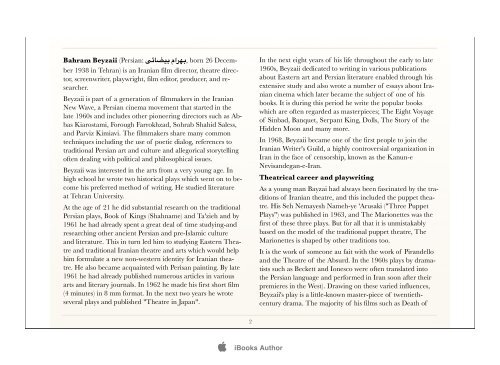Create successful ePaper yourself
Turn your PDF publications into a flip-book with our unique Google optimized e-Paper software.
Bahram Beyzaii (Persian: !"#$%& ,&*(ام born 26 December<br />
1938 in Tehran) is an Iranian film director, theatre director,<br />
screenwriter, playwright, film editor, producer, and researcher.<br />
Beyzaii is part of a generation of filmmakers in the Iranian<br />
New Wave, a Persian cinema movement that started in the<br />
late 1960s and includes other pioneering directors such as Abbas<br />
Kiarostami, Forough Farrokhzad, Sohrab Shahid Saless,<br />
and Parviz Kimiavi. The filmmakers share many common<br />
techniques including the use of poetic dialog, references to<br />
traditional Persian art and culture and allegorical storytelling<br />
often dealing with political and philosophical issues.<br />
Beyzaii was interested in the arts from a very young age. In<br />
high school he wrote two historical plays which went on to become<br />
his preferred method of writing. He studied literature<br />
at Tehran University.<br />
At the age of 21 he did substantial research on the traditional<br />
Persian plays, Book of Kings (Shahname) and Ta'zieh and by<br />
1961 he had already spent a great deal of time studying-and<br />
researching other ancient Persian and pre-Islamic culture<br />
and literature. This in turn led him to studying Eastern Theatre<br />
and traditional Iranian theatre and arts which would help<br />
him formulate a new non-western identity for Iranian theatre.<br />
He also became acquainted with Perisan painting. By late<br />
1961 he had already published numerous articles in various<br />
arts and literary journals. In 1962 he made his first short film<br />
(4 minutes) in 8 mm format. In the next two years he wrote<br />
several plays and published "Theatre in Japan".<br />
In the next eight years of his life throughout the early to late<br />
1960s, Beyzaii dedicated to writing in various publications<br />
about Eastern art and Persian literature enabled through his<br />
extensive study and also wrote a number of essays about Iranian<br />
cinema which later became the subject of one of his<br />
books. It is during this period he write the popular books<br />
which are often regarded as masterpieces; The Eight Voyage<br />
of Sinbad, Banquet, Serpant King, Dolls, The Story of the<br />
Hidden Moon and many more.<br />
In 1968, Beyzaii became one of the first people to join the<br />
Iranian Writer's Guild, a highly controversial organization in<br />
Iran in the face of censorship, known as the Kanun-e<br />
Nevisandegan-e-Iran.<br />
Theatrical career and playwriting<br />
As a young man Bayzai had always been fascinated by the traditions<br />
of Iranian theatre, and this included the puppet theatre.<br />
His Seh Nemayesh Nameh-ye 'Arusaki ("Three Puppet<br />
Plays") was published in 1963, and The Marionettes was the<br />
first of these three plays. But for all that it is unmistakably<br />
based on the model of the traditional puppet theatre, The<br />
Marionettes is shaped by other traditions too.<br />
It is the work of someone au fait with the work of Pirandello<br />
and the Theatre of the Absurd. In the 1960s plays by dramatists<br />
such as Beckett and Ionesco were often translated into<br />
the Persian language and performed in Iran soon after their<br />
premieres in the West). Drawing on these varied influences,<br />
Beyzaii's play is a little-known master-piece of twentiethcentury<br />
drama. The majority of his films such as Death of<br />
2<br />
apple iBooks Author


















